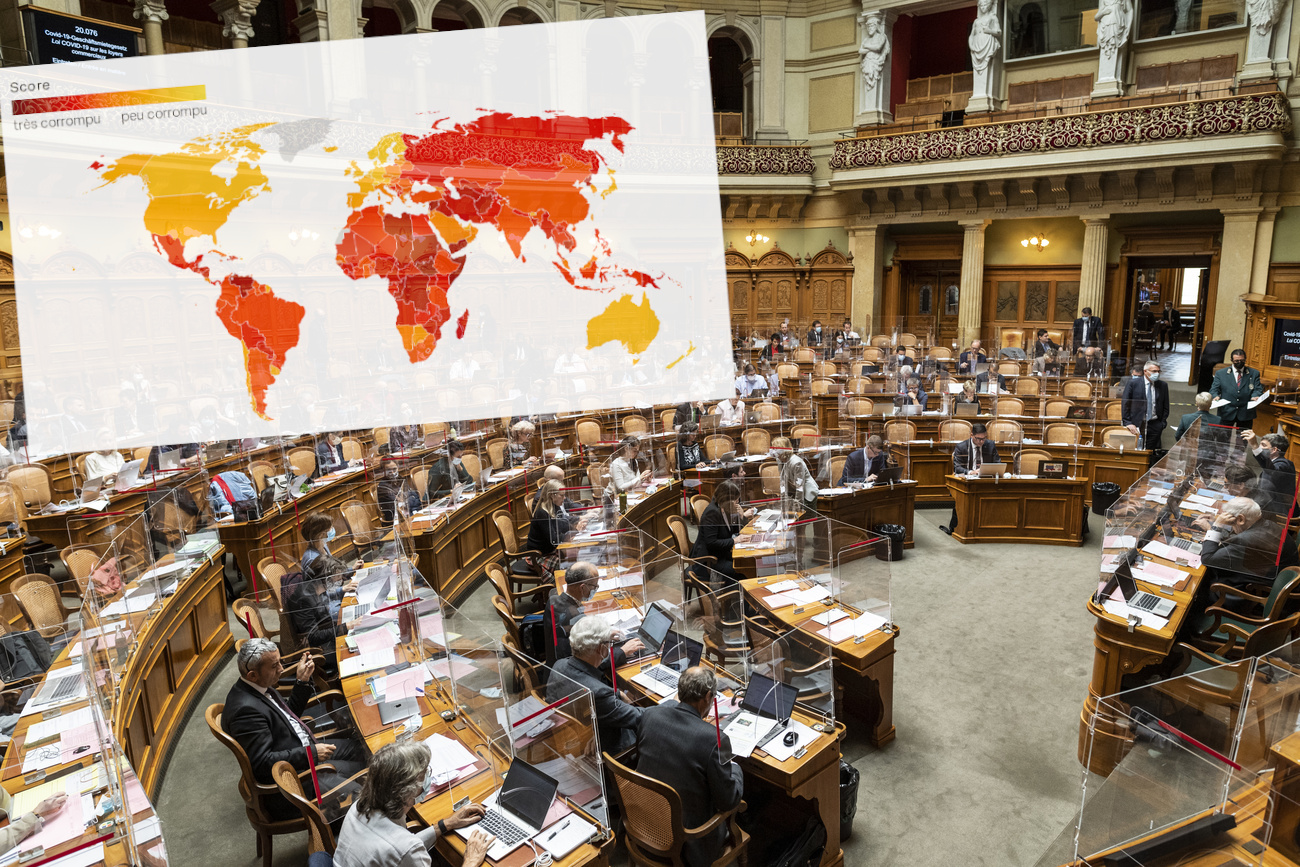Transparency International: in fight against corruption, Switzerland can do better

Switzerland is perceived as having some of the lowest levels of corruption in the public sector according to Transparency International’s latest Corruption Perceptions Index. However, the NGO says the country still has work to do, specifically on political lobbying and money laundering.
The Alpine nation is accustomed to being one of the top performers in the annual ranking measuring perceived levels of public sector corruption in around 180 countries, and the 2020 ranking is no exception.
After dropping a spot in 2019, Switzerland is back in third place (the third time in four years), tying with Finland, Singapore and Sweden with a score of 85 out of 100. New Zealand and Denmark both scored 889 points to take top spot. Somalia and South Sudan fared worst with scores of 12 to put them at 179th place, behind Syria with a score of 14.
First published in 1995, the index is calculated using 13 different data sources that provide perceptions of public sector corruption from businesspeople and country experts.
“Switzerland regularly scores well, and that’s good news,” said Martin Hilti, director of the Swiss chapter of Transparency International. However, he was quick to point out that the country is also 15 points away from the best score.
Hilti pointed out that corruption remains a problem in Switzerland citing various scandals in recent years, some of which include the rewarding of public contracts. Some common practices in the public sector also create conflicts of interest and thus raise the risk of corruption.
“Cronyism is a widespread practice,” he told swissinfo.ch. One issue is that Swiss parliamentarians are allowed to have various paid mandates outside of their political activities, which he believes creates conflicts.
The director of Transparency Switzerland also noted recent controversies where ministers and high-ranking civil servants accept positions in the private sector as soon as their political mandates are over.
Beyond the public sector
Hilti also argued that Switzerland’s good performance in the index is “dangerous, because it only shows part of the truth”.
The biggest challenges are in the private sector, which is not included in the index, he said. This can concern money laundering in the financial sector or the involvement in financing corruption abroad.
The NGO finds that Switzerland still doesn’t have effective mechanisms to detect corruption cases and to prevent and stamp out money laundering.
Switzerland’s legal basis for combating money laundering contains significant gaps in relation to minimum international standards, and its scope of application should be extended, Hilti argued.
Switzerland could also do much better in terms of whistleblower protection, he added.
Another blind spot concerns major international sports organizations, such as FIFA, which are almost all headquartered in Switzerland and present a greater risk of corruption because of the huge amounts of money they handle.
“Because they are based in Switzerland, the responsibility for regulating them lies with Switzerland,” Hilti said.
Covid-19 impact
The 2020 edition of the Index also looked at the links between corruption and the government response to Covid-19 noting that corruption “undermines health systems and contributes to the decline of democracy”.
The report shows that the least corrupt countries invest more in the health system, are better able to provide universal health coverage and are less likely to violate democratic norms and institutions or the rule of law.
Transparency International cites the example of Bangladesh (26 points in Index) where there is pervasive corruption in the provision of medical supplies; or the Philippines (34 points), where the fight against coronavirus was accompanied by major attacks on human rights and press freedom.
Even in New Zealand, which took the top spot and has been lauded for its pandemic response, there was room for improvement, the NGO noted. “While the government communicates openly about the measures and policies it puts in place, more transparency is needed around public procurement for Covid-19 recovery,” the organization wrote.
“The Covid-19 pandemic has allowed the centralisation of more power in the hands of governments, thus increasing the risk of abuse,” explained Hilti.
And even if such abuses have not been observed in Switzerland, he said that the pandemic had highlighted problems, especially “the weight of lobbying”.
“We have seen that organizations which had good access to the government or the federal administrations had more opportunities to make their voices heard during the crisis,” he told swissinfo.ch.

In compliance with the JTI standards
More: SWI swissinfo.ch certified by the Journalism Trust Initiative












You can find an overview of ongoing debates with our journalists here . Please join us!
If you want to start a conversation about a topic raised in this article or want to report factual errors, email us at english@swissinfo.ch.